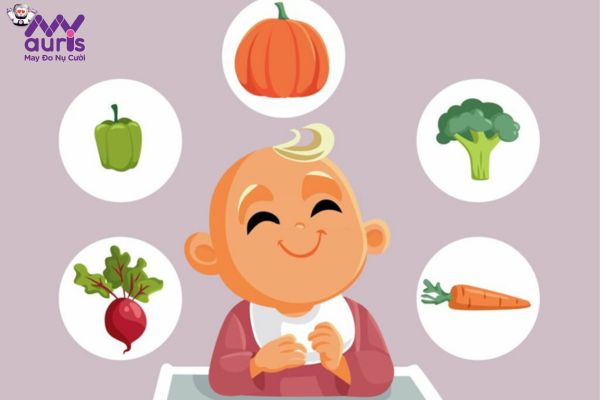Babies are said to be teething or called baby teething when there are signs of one or several first teeth appearing. Normally, when a baby is 6 months old, his first teeth will begin to grow. Therefore, many parents worry about whether their 8-month-old child has no teeth yet. So what causes babies to grow teeth late, and does this affect their development? Let’s find out the necessary information with My Auris!
The reason why 8-month-old babies don’t have teeth yet
The first teeth will be as important as permanent teeth. They have the ability to help babies bite and crush food. That way, babies will digest and absorb nutrients from food more easily. In particular, baby teeth also help permanent teeth grow in the right position and support the baby in learning to speak and pronounce. From these benefits, many parents see that their 8-month-old child has not yet grown teeth and has many worried thoughts.

Delayed teething is a condition in which baby teeth grow slower than the average milestone for babies. Normally, 6-month-old babies will begin to grow their first teeth. Therefore, there will be a number of factors that cause an 8-month-old baby to not have teeth yet:
- In families where relatives have slow teething, the baby can also inherit this gene.
- Baby has oral cavity infection – Causes baby teeth to grow slowly.
- The baby has rickets, malnutrition and slow growth, lacking vitamin D and calcium along with other essential nutrients.
- The baby is given nutritional supplements with an unreasonable regimen, leading to nutritional deficiencies.
- The baby starts solids late so the chewing and swallowing reflex is not stimulated.
Is it okay if teeth haven’t come out in 8 months?
In fact, teeth are formed right from the embryonic stage, they will be located in the baby’s jawbone. Some time after birth, baby teeth officially appear. On average, children usually need 2 to 3 years to grow a full set of 20 baby teeth. When an 8-month-old baby has not yet teethed, it is determined that sooner or later this will be followed in the following order:

| Time teething point | Number |
| 6 to 10 months old | 2 incisors |
| 8 to 12 months old | 2 next incisors |
| 9 to 13 months old | 2 lateral incisors on |
| 10 to 16 months old | 2 lower lateral incisors |
| 13 to 19 months old | 2 molars |
| 14 to 18 months old | 2 lower molars |
| 16 to 22 months age | 2 upper canines |
| 17 to 23 months old | 2 lower canines |
| 25 to 33 months old | last 2 upper molars |
Thus, according to the order, an 8-month-old baby who has not yet had teeth is not considered too late. Some babies have teeth early, around 4 to 5 months old. Babies can grow teeth later than expected, from about 8 to 9 months old. Even 1-year-old babies have their first teeth.
Basically, early or late teeth are not a concern, as long as the baby is still in a good state of physical and mental development Watch for other accompanying unusual symptoms. Only then can you accurately determine whether your baby is teething at 8 months or not.
When should you take your baby with late teething to see a doctor?

First of all, parents need to determine whether their 8-month-old baby has not yet had teeth or is an older baby.Is it due to genetics or not? If no one in the family has delayed teething, parents should monitor some other signs such as whether the baby’s weight gain, eating, and sleep are affected.
Many parents consider their child’s slow teething to be a sign of intelligence. But in fact there is no scientific evidence to prove it. Furthermore, if your 8-month-old baby has not yet grown teeth, it may be accompanied by signs of abnormal development such as slow growth in height, weight, lack of teeth, lack of appetite, malnutrition, fussiness, rickets, etc.; then you need to see a doctor soon. quality, deterioration,… from there, the baby receives timely treatment.
What supplements should an 8-month-old baby not have teeth yet?
However An 8-month-old baby who hasn’t teethed yet isn’t a dangerous problem, but that doesn’t mean parents should be negligent. To provide good support for babies during the teething stage, nutrition needs to be given top priority by parents. Below are some substances that need to be supplemented for your baby during the teething stage.

- Foods rich in calcium: This is a nutrient that plays an important role in the formation of baby’s bone and tooth structure. The 8-month-old baby is already eating solid foods, but the mother still needs to continue breastfeeding the baby. At the same time add foods such as yogurt, whey, fish, shrimp, crab, dark green vegetables,…
- Foods with vitamin D content: This is a transporter that helps bring calcium and phosphorus to the “target” location. Therefore, when supplementing calcium, do not forget to add vitamin D. It is best for mothers to choose products that supplement both nutrients at the same time, helping the baby absorb better.
- Foods rich in phosphorus: In addition to calcium, phosphorus is also an essential nutrient for bones and teeth. It is abundant in natural foods, so parents also need to make sure their baby’s daily menu is rich, diverse and can provide the necessary amount of phosphorus.
- Foods rich in magnesium: Magnesium helps the body absorb vitamin D and metabolize calcium. Therefore, for 8-month-old babies who have not yet grown teeth, parents should give their children magnesium-rich foods such as nuts, beans, crabs, crabs, shrimp, green vegetables,…
- Foods rich in vitamin C: If children lack vitamin C, they are at risk of tooth disease, gingivitis, bleeding gums, tooth decay, etc.At the age of teething, you should eat a lot of foods containing vitamin C such as grapefruit, lemons, oranges, tomatoes, cauliflower,…
In short, 8-month-old babies who have not yet teethed are not a big concern. Therefore, parents should not be too worried, but also do not be subjective. You need to pay more attention to your child’s nutrition at this age to help your child develop healthily and comprehensively, and limit illnesses. Consult with your doctor for further nutritional advice and design a nutritional menu suitable for your baby’s condition!
Yen Nhi





